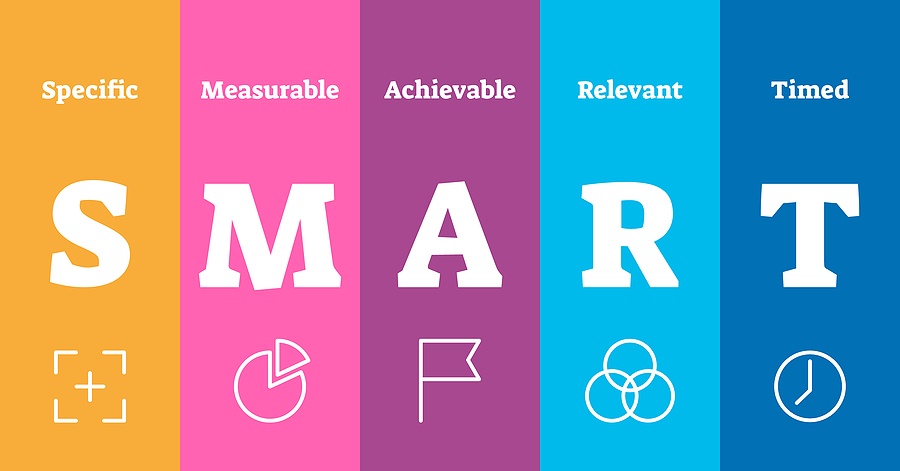10 Smart Goals ALL Music Artists Need to Set In 2023

*This article may contain links to affiliate products & services. We have reviewed these services to try and ensure the highest quality recommendations*
Written by Ramsey Brown.
Goal setting is a major key to a successful music career. Whether it be a life goal, personal goal, or business goal, it’s important to have a specific outline of what you want to achieve in life and plan for how exactly you are going to achieve it.
Most everyone has a set of goals for themselves — because having goals is the easy part. Unfortunately, most people never meet their goals because taking the proper steps to actually achieve them is the hardest part.
If you find that you are consistently not reaching or giving up on your goals, it’s time to find a new and better way of setting your intentions towards them.
“A goal without a plan is just a dream.”
There is a significant difference to be made between a goal and a dream. To be put simply, a dream is wishing and a goal is doing. Goals are backed with a deadline and a strategic plan to accomplish it.
When you map out your dreams with a sense of how you are going to reach them, it then becomes a feasible goal instead of a hopeful idea or wish.
So, how does one go about bringing their goals into fruition? Well, it all starts by setting SMART goals. Without the use of SMART goals, you could be holding yourself back from ultimate success.
What is a SMART Goal?
A smart goal is an acronym and more importantly a tool for outlining a strategy for reaching any objective.
It is a way of setting goals where you can clarify your ideas, focus your efforts, use your time and resources productively, and increase your chances of achieving what you want in life.
The definition of the acronym is:
Specific
Measurable
Achievable
Relevant
Time-Bound
When goals aren't met, it’s likely because they are too vague, overambitious or unplanned. But when SMART goals are made, it eliminates generalities and guesswork, sets a clear timeline, and makes it easier to track progress and identify missed milestones.
SMART Goals for Musicians
If you are a musician, you know that success doesn’t happen overnight (despite popular belief). Although it’s great to have the ‘I want to become a famous musician’ mindset, it’s unlikely to happen unless you have some specific measures and plans in place in order to get there.
This is exactly where SMART goals come into play. It is easy for an artist to say “I want to get a lot of fans” or “I want the world to hear my music”. However, without proper strategies and planning, this is merely an unspecified want.
Instead of aiming for the overall main goal of ‘becoming a successful music artist’ — narrow that down into multiple smaller and more specific goals. These smaller steps should be specific towards your music career and should also be measurable, achievable, realistic, and time-bound.
Your SMART goals should also be written down in a place where you can look back on them and your progress frequently. When goals are taken out of your head and put into physical reality such as on paper or a vision board, it helps to hold yourself accountable and stay motivated in achieving them.
For music artists, most everyone has the common overall goal of wanting to become successful. But when using SMART goals, each and every musician will have a different path or strategies for how they plan to get there
10 SMART Goals ALL Music Artists Need to Set
If you’re a musician and don’t currently have any smart goals in place — don’t worry. We’ve made a list of 10 SMART goals that ALL musicians can benefit from in 2022.
We are going to start by listing 10 vague goals that most musicians have in common. Then, we are going to break down each goal using the SMART formula, which clearly defines the objective and the step-by-step process of how to achieve them. Check out our examples below:
1) 'Play More Shows'
Every artist and band wants to play more shows. Instead of having an overall objective to play more shows, break it down using the SMART formula:
Specific: In order for a goal to be effective, it needs to be specific. Ask yourself questions like: Why do I want to play more shows? What will be accomplished by playing more shows? Thinking through these questions helps get to the heart of what you’re aiming for.
Measurable: You need to have a measurable goal in order to keep track of your progress. Instead of saying “I want to play more shows”, have a solid trackable benchmark like “I want to play 1 show a month in 2022".
Achievable: Your goal needs to be realistic and attainable in order to achieve it. Realize your capabilities and your constraints when setting them, don’t stretch your boundaries outside of what is physically possible for you. This may look like “I want to play one show a month at a LOCAL venue”.
Relevant: This is where you need to think about the big picture and how your SMART goal relates back to that. If the big picture is ‘becoming a famous musician’, then playing more shows is relevant because it is ultimately increasing your brand recognition. Always go back and ask yourself “why am I setting this goal?”
Time-Bound: Every good goal needs a target date. When you create a deadline for yourself, it gives you a reason to focus and work towards meeting that deadline. It isn’t enough to set the goal of ‘playing 12 shows in 2022’. Instead, set a time-specific goal to book a venue 5 months ahead of the show, giving yourself a timeframe to organize the event, confirm details, and promote it properly.
* Moving forward, we will use this same formula to re-work the goals into SMART goals:
2) 'Grow a Bigger Fanbase'
I want to grow my ONLINE fan base by x3 in 6 months by using paid Facebook and Instagram ads. I am growing my fanbase to increase overall brand awareness and will achieve it by spending $25 per month through ____ promotion company.
3) 'Create More Music'
I will create one new song per week for 3 months straight as part of an overall strategy to become a more active and current musician. It is financially reasonable and responsible for me to book 8 hours of studio time per week. I will use these 8 hours of studio time to ensure my track is fully mixed and mastered by Friday at 11:00pm.
4) Consistently Release Tracks
In order to stay relevant and more engaged with my fans, I plan to release one new single per month on all major streaming platforms. The first week of the month will be spent preparing my song for release and uploading it to my distributor. In order to stay consistent with my audience, each track will be released on the third Friday of each month.
5) Grow Social Media Following
As part of a larger effort to become a more popular musician, I plan to grow my social media following on Instagram from 3.5k followers to 8k followers in the matter of 10 months. In order to achieve this, I will map out a set social media strategy and make a post every other day. To save time, I will schedule these posts two weeks in advance. I will also spend $____ with a social media marketing agency that can guarantee me X amount of followers in X amount of time.
6) Improve Music Skills
Because I want to become an overall better music producer, I am going to dedicate 5 hours a week learning how to use a new production program/piece of equipment. I want to fully understand and operate the equipment within 3 months of practicing. I will know that I have improved my skills once I finish the necessary training courses and am able to produce a song efficiently using the new system.
7) Earn Money From Music
To turn my passion for music into a more lucrative business, I will utilize all opportunities to make a profit. To do this, I will post my artist/band profile on gig-finder websites and update my profile regularly to score paid gigs. I will also start offering music lessons and run weekly ads in the local newspaper to get the word out.
Because merchandise is a top revenue stream for artists, I will also set up and promote an e-commerce website. I will take every Sunday to manage orders and ship out packages. With these 3 revenue streams in place, I am looking to double my current income from music.
8) Learn the Music Business
I know learning the overall music business will help my overall music career, so I have purchased the books and courses necessary to improve my overall knowledge of the industry. Because I have little free time during the week, I will dedicate an hour out of my Sunday evenings to completing these courses and reading materials. I will also use the audio books so I can multi-task learning while doing laundry and meal-prepping.
9) Get Press Coverage
To get more recognition locally as a music artist, I’m aiming to get more press coverage. To do this, I will first need to complete my EPK. In order to keep my efforts attainable, I will only send out my EPK to the media outlets that I know accept smaller, independent artist submissions. Because I am aiming for 5 press features, I will make a list of around 50 feasible blogs, magazines, newspapers, podcasts, etc., to reach out to — knowing that typically 5% will respond back.
10) Gain More Exposure
Since ‘gain more exposure’ is such a vague goal, I need to break it down into smaller, more manageable goals in order to actually achieve gaining more exposure. I know that all 9 goals mentioned above are ultimately aimed to get me more exposure as an artist, but to make it a SMART goal I must make it specific, measurable, achievable, relevant, and time-bound. These are all objective to me as a music artist.
Wrapping Up
After reading this article, we hope that you understand the true meaning of setting SMART goals for yourself. Having goals is great, but achieving your goals is even better. By breaking down your larger goals into smaller more attainable objectives, you are sure to have a better success rate in the long run.
When your song is ready to go, it's time to start promoting it to potential fans! Omari has the best organic promotion services money can buy. With packages for Spotify, TikTok, Instagram, and YouTube, we will get your music the traffic and attention it deserves! Click below for more information.
SPEAK YOUR MIND
How This INDIE Artist Got Over 67,598,275 Streams On ONE Song
Join the No-Nonsense Music Marketing Newsletter to get the most valuable weekly case studies and strategies to grow your music business!



